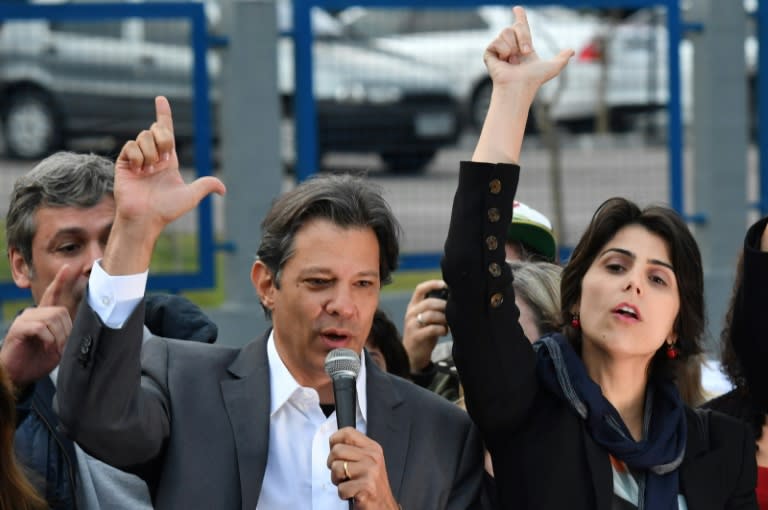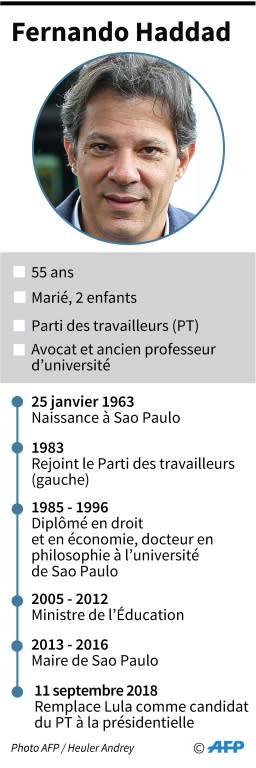Tough challenges facing Brazil presidential wannabe stepping into Lula's shoes
Fernando Haddad, the man stepping into former president Luiz Inacio Lula da Silva's shoes at the last minute after the jailed ex-leader finally dropped his bid for re-election, has a good chance of making the run-off in next month's polls. But to win the presidency, Haddad will have to distance himself from the iconic Lula, a towering figure of Brazilian politics. Lula, who held office from 2003 to 2010, gave his blessing Tuesday for Haddad to replace him, two weeks after the Supreme Court upheld a ban on his own candidacy issued by the country's electoral commission. Lula waited until the last minute of a court-imposed deadline to pass the baton to Haddad, after having exhausted all his legal options to allow him to run for a third term despite being jailed for 12 years on corruption charges. But he gave his former education minister, seen as a less fiery but more also more conciliatory figure, his full blessing for the election, due to take place on October 7. Haddad, who has also served as mayor of Sao Paulo, the country's business hub, faces an uphill battle, with very little time left to launch a campaign and with his rivals already well ahead of him on the trail. - "A matter of time" - The 55-year-old lawyer and former university professor was not widely known across the huge country, and latest polls showed just eight or nine percent of the population planning to vote for him. That is well behind the 40 percent backing that had made Lula a front-runner, even after being jailed. But Haddad will be able not just to count on Lula's support but also on the powerful electoral machinery of his Worker's Party, which Lula, a former trade union leader, founded back in the 1980s. He will also have benefit of the second-largest allocation of television airtime, a trump card in a country where the vast majority of voters form their political opinions based on television viewing. The Workers Party also has a powerful presence on social media networks, as well as a dedicated army of grassroots activists. "Given all of that, it's hard to imagine him not making it to the second round," Lincoln Secco, a Sao Paulo University professor specializing in the history of the Workers Party, told AFP. "It's only a matter of time before voters recognize Haddad as Lula's candidate," he said. One the key challenges for Haddad will be wooing voters away from the center-left candidate Ciro Gomes, who is well established in the struggling northeast of the country -- part of the Workers Party heartland -- and whose campaign has already got off to a flying start. Gomes, who also served as a minister under Lula, is currently in second place in polls, with between 11 and 13 percent, trailing the far-right candidate Jair Bolsonaro who has 24-26 percent of the vote, according to surveys. - Lula's puppet? - The sometimes stifling influence of Lula on the Workers Party decision-making process, and the fact that Haddad has made multiple visits to the jailed party boss' prison cell, have prompted the question in some quarters of whether the new candidate will be any more than a Lula puppet. On social media networks, the Workers Party itself launched a campaign promoting the hashtag #LulaéHaddad ("Lula is Haddad"). "In the first round, Haddad will be the voice of Lula, but for the second round, he will have to assert his independence and show his more moderate side," said Thomaz Favaro, a political analyst at the Control Risk consultancy. Given the likelihood that he will have to face off against Bolsonaro, a former military officer, in a second round, the pressure will be on Haddad to appeal to the center-right of the electorate, which is viscerally opposed to the leftist Workers Party. And if he does make it to power, Haddad will inherit a country mired in crippling debt, with feeble growth and 13 million unemployed. The serious economic situation could call for him to ask Brazilians to tighten their belts and put a brake on the Workers Party's ambitious social reform programs. "If he is elected, he'll have to find a balance between his conciliatory nature and the party, whose program has become more radical since the last elections," said Favaro.




